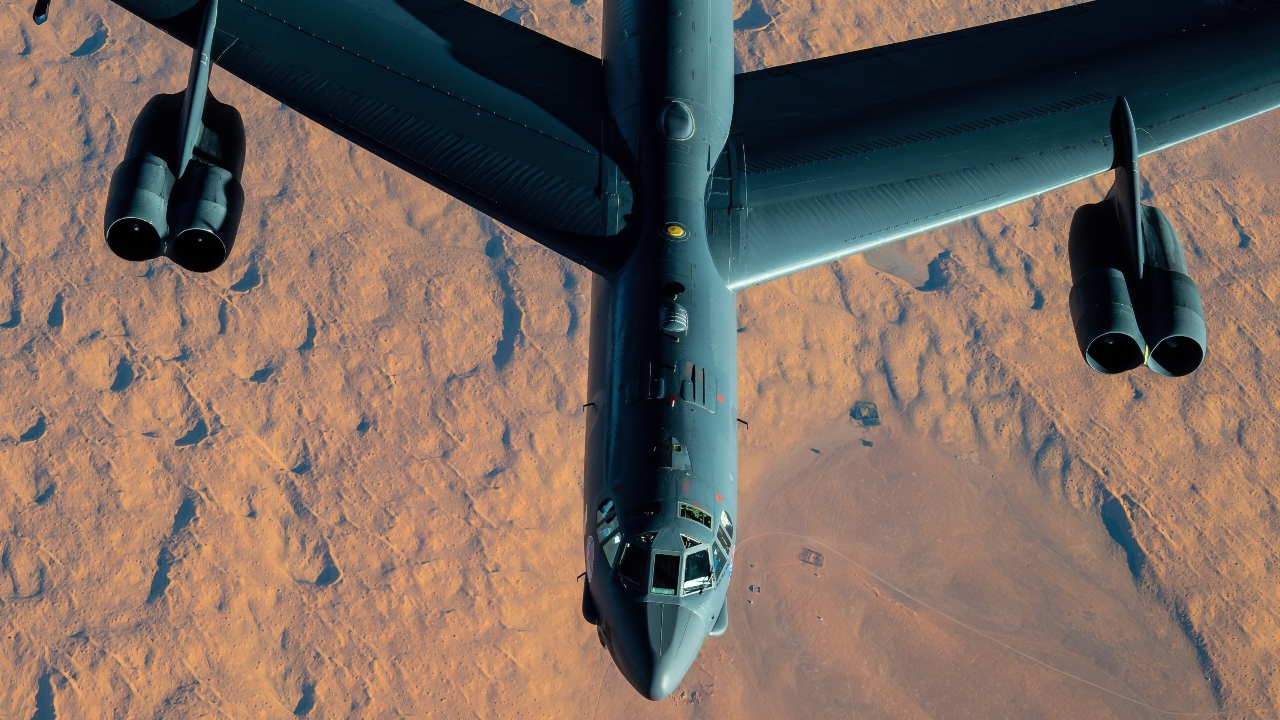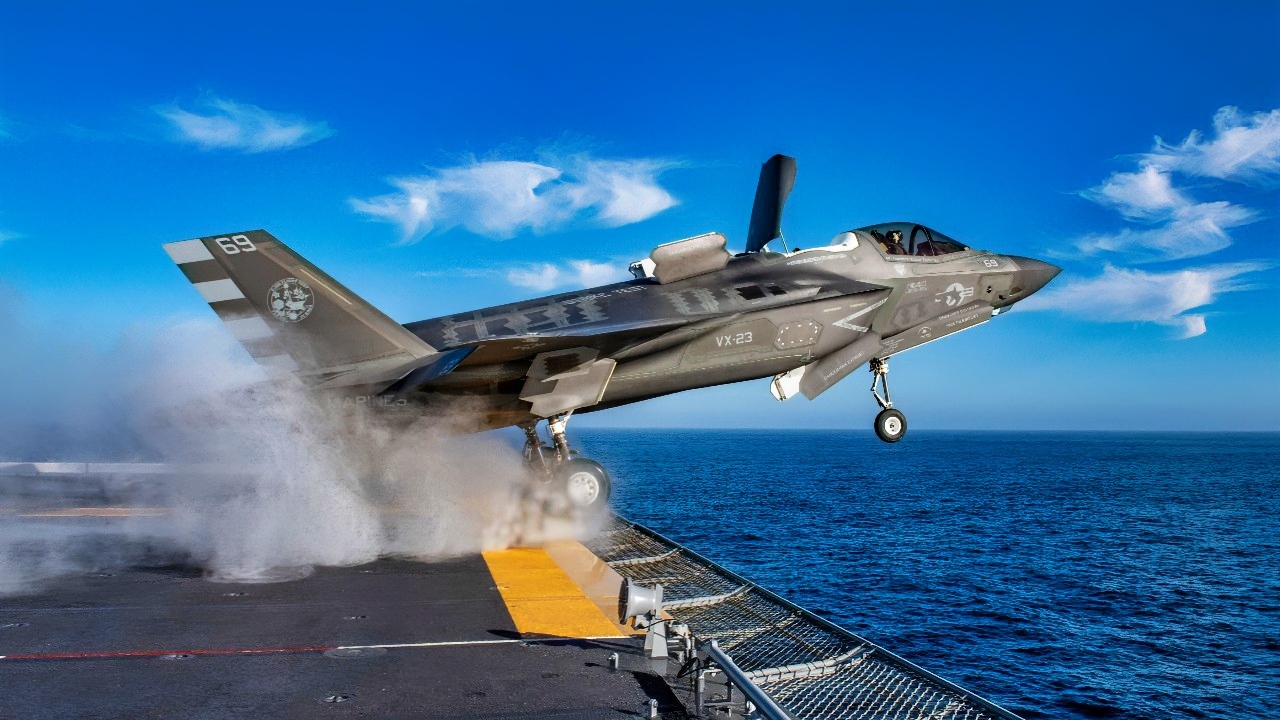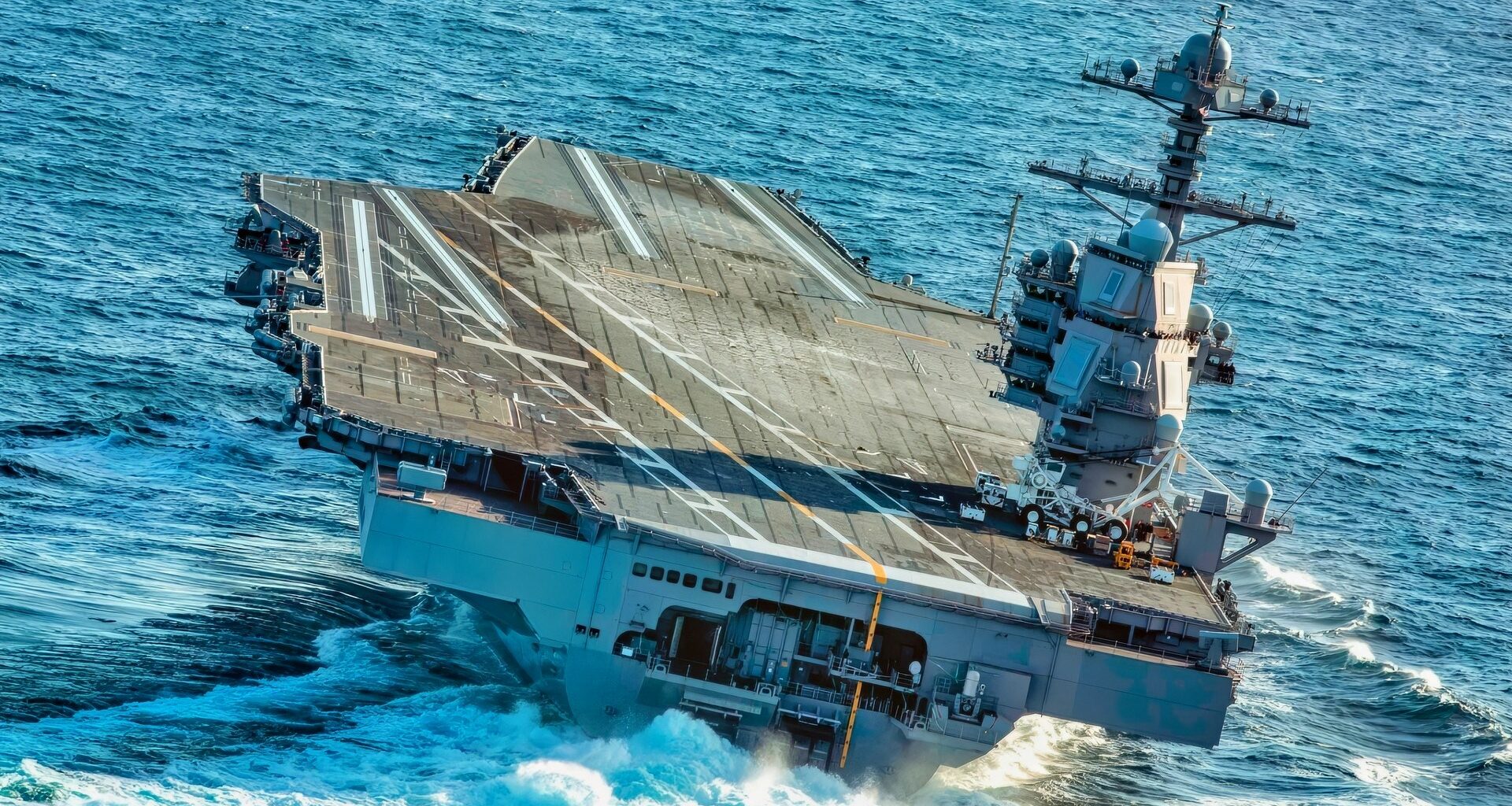Key Points and Summary – The “alarming” U.S. military buildup in the Caribbean is a “compellence campaign” against Venezuela, not a counter-drug operation.
-However, the administration’s demands are “frustratingly vague,” making it unclear what Venezuela must do to avoid conflict.

A U.S. Air Force B-52 Stratofortress, assigned to the 2nd Bomb Wing, receives fuel from a KC-135 Stratotanker, assigned to the 340th Expeditionary Air Refueling Squadron, during a multi-day Bomber Task Force mission over Southwest Asia, Dec. 10, 2020. The B-52 is a long range bomber with a range of approximately 8,800 miles, enabling rapid support of Bomber Task Force missions or deployments and reinforcing global security and stability.(U.S Air Force photo by Master Sgt. Joey Swafford)

A joint team consisting of F-35 Patuxent River Integrated Test Force flight test members, U.S. Sailors and Marines, and the crew of the Japan Maritime Self-Defense Force Izumo-class multi-functional destroyer JS Kaga (DDH-184) are executing developmental sea trials in the eastern Pacific Ocean to gather the necessary data to certify F-35B Lightning II short takeoff and vertical landing aircraft operations. While aboard the MSDF’s largest ship, the Pax ITF flight test team has been gathering compatibility data for analysis in order to make recommendations for future F-35B operational envelopes, further enhancing the Japanese navy’s capabilities. The results of the testing will contribute to improved interoperability between Japan and the United States, strengthening the deterrence and response capabilities of the Japan-U.S. alliance and contributing to peace and stability in the Indo-Pacific region. Japan is an F-35 Joint Program Office foreign military sales customer planning to purchase 42 F-35Bs. The F-35 Joint Program Office continues to develop, produce, and sustain the F-35 Air System to fulfill its mandate to deliver a capable, available, and affordable air system with fifth-generation capabilities.
How Strikes on Venezuela Could Become a Large War No One Saw Coming
What’s going on with Venezuela?
Over the past two months, the United States has engaged in an alarming buildup of military capabilities in the Caribbean.
These capabilities vastly exceed the demands of even the most ambitious counter-narcotics program.
A report from the Miami Herald (quickly disavowed by the Trump administration) suggested that plans were in place for an extensive military campaign against Venezuela that would target military installations and suspected narcotics transit points on the way to a potential regime change campaign.
Nevertheless, official Trump administration statements have been frustratingly vague regarding the desired outcomes of policy towards Caracas. Are we at risk of drifting into war with Venezuela?
Compellence
The current buildup in the Caribbean appears to be a compellence campaign. Compellence is the concept that the threat of military force can persuade a target country to alter its behavior. A mugger, for example, threatens a target with violence in order to acquire a wallet.
A campaign of compellence does not necessarily result in military action; the target can comply with a demand (making war unnecessary), or resistance may reveal the campaign was a bluff.
The US is assembling way more force than it needs to hunt drug smugglers, and US officials have made (albeit in contradictory fashion) statements that sound like the US is preparing for an extended military campaign.
But for compellence to work, the target needs to know what it’s supposed to do and be able to do that thing; the victim needs to have a wallet and to have the capacity to turn the wallet over to the mugger.
In this case, it’s not entirely clear what the Venezuelan government can do to appease the Trump administration.
Venezuela is a transit point for some narcotics, and undoubtedly, some Venezuelan bureaucrats (like corrupt officials all over the world) participate in the drug trade. Still, Venezuela’s role is not particularly large, and it’s nearly impossible to stamp out either corruption or narco-trafficking completely.
The US has not thus far demanded regime change, and it is exceedingly unlikely in any case that the Maduro regime could or would comply with such a demand.
Sphere of Interest
Instead of thinking of the US buildup as an ends-means project, it may be better to approach it in atmospheric terms. The idea of “spheres of interest” seems to animate many strategists within and around the administration.
The argument, arising from a strange form of “realist” international relations theory, suggests that great powers effectively have certain rights and responsibilities within ill-defined regional neighborhoods.
This kind of logic tends to excuse “disciplinary” operations such as Russia’s invasion of Ukraine, and indeed, appropriate blame for international disorder to states that don’t know their place or don’t respect the prerogatives of other great powers.
This kind of analysis places Latin America squarely within the US sphere of interest. By this logic, the United States has both the right and the responsibility to establish order in the Americas.
Venezuela’s leftist regime has created disorder by participating in narco-trafficking, by maintaining a political system that generates huge numbers of refugees, and by mismanaging its energy industry. In this context, military threats against Venezuela are less about the achievement of any specific end than about the reassertion of regional US prerogatives.
Mexico and Cuba
A follow-on logic to this argument involves Venezuela’s influence over other states in the region, particularly Cuba and Mexico. Cuba, the argument goes, is dependent on Venezuelan energy subsidies for its survival. “Solving” Venezuela consequently solves Cuba, an achievement that has long eluded US policymakers and that would probably appeal to President Trump’s sense of self-importance.
As for Mexico, a campaign to discipline Venezuela would presumably send signals to both the Mexican government and to drug cartels based in Mexico that the United States is serious about using military force to manage its neighborhood, and in particular to curtail the transit of narcotics (and possibly immigrants) towards the US border.
Whether Mexico City would take this seriously is an entirely different question; Mexico is vastly larger than Venezuela and may not find US military threats at all credible under any circumstances.
What Happens Now?
The signals sent by the administration are confusing, making the entire situation hard to understand.
If President Trump is seeking to make a credible threat against the Maduro regime, peaceful noises undercut that effort.
Some within the Trump administration may believe that threats of force, possibly followed up by strikes against regime targets, will be sufficient to topple the Caracas regime.
This is—an awfully optimistic way of looking at things.
Military campaigns have a self-reinforcing tendency, and if the bombs start dropping on Venezuela, it will be hard to stop the escalation for as long as the Maduro regime remains in power.
Accidental wars are rare, but small wars often “accidentally” become large wars.
About the Author: Dr. Robert Farley, University of Kentucky
Dr. Robert Farley has taught security and diplomacy courses at the Patterson School since 2005. He received his BS from the University of Oregon in 1997, and his Ph.D. from the University of Washington in 2004. Dr. Farley is the author of Grounded: The Case for Abolishing the United States Air Force (University Press of Kentucky, 2014), the Battleship Book (Wildside, 2016), Patents for Power: Intellectual Property Law and the Diffusion of Military Technology (University of Chicago, 2020), and most recently Waging War with Gold: National Security and the Finance Domain Across the Ages (Lynne Rienner, 2023). He has contributed extensively to a number of journals and magazines, including the National Interest, the Diplomat: APAC, World Politics Review, and the American Prospect. Dr. Farley is also a founder and senior editor of Lawyers, Guns and Money.
More Military
The M113: America’s “Forgotten” APC That Just Won’t Quit
How British Aircraft Carriers Keep Sinking in War Games
Boeing F-47 NGAD Fighter: One Missing Fact Could Decide Its Fate
Canada Knows How to Sink U.S. Navy Nuclear Aircraft Carriers
